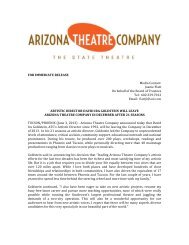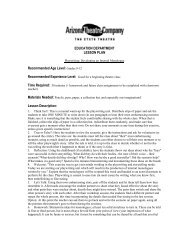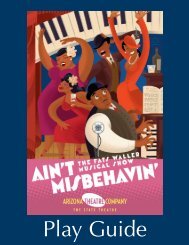THE KITE RUNNER Arizona Theatre Company Play Guide 1
THE KITE RUNNER Arizona Theatre Company Play Guide 1
THE KITE RUNNER Arizona Theatre Company Play Guide 1
Create successful ePaper yourself
Turn your PDF publications into a flip-book with our unique Google optimized e-Paper software.
<strong>THE</strong> <strong>KITE</strong> <strong>RUNNER</strong><br />
ETHNICITIES<br />
economy are farming and herding. In general the Hazarajat<br />
is a very neglected area. There is little infrastructure or<br />
basic services available to the Hazara people of this region.<br />
Because of the difficulties of life in the Hazarajat and the<br />
lack of economic opportunity there, many Hazaras have<br />
migrated to cities such as Mazar I. Sharif and Kabul. In<br />
the 1960s, an estimated 30 to 50 percent of Hazara men<br />
migrated from the Hazarajat to the cities. There they were<br />
(and still are) generally employed in low-wage jobs and tend<br />
to occupy the lowest socioeconomic classes.<br />
The Hazaras have not passively accepted their oppressed<br />
status, however. In the 1960s and 1970s, many Hazaras<br />
united in an attempt to organize for greater rights and<br />
opportunities. During the Soviet occupation of Afghanistan,<br />
the Hazaras battled the Communist government for control<br />
of the Hazarajat, and maintained a greater level of selfdetermination<br />
than many other areas of Afghanistan under<br />
Soviet rule. In the 1980s, an agreement was reached<br />
between the Afghan government and the Hazaras that they<br />
would live independently within Afghanistan in exchange<br />
for a peaceful relationship with government forces. However,<br />
the Taliban were ruthless in their persecution of the Hazaras,<br />
most notably perpetrating a massacre in the city of Mazar I.<br />
Sharif in 1998 that killed over 8,000 people, of whom the<br />
overwhelming majority were Hazaras targeted because of<br />
their religion.<br />
-written by Laura Farrell-Wortman, dramaturgical intern<br />
PASHTUNWALI<br />
Pashtunwali literally means the way of the<br />
Pashtuns. It is the rules, regulations, laws and<br />
moral code of the Pashtun tribes which have<br />
protected the world’s largest tribal society for<br />
over 2000 years. Pashtunwali is evident in The<br />
Kite Runner through Baba’s protection of Ali and<br />
Hassan and through the hospitality of Farid’s<br />
family, who fed Amir as their guest, even though<br />
the family could not afford to feed themselves.<br />
Costume Design Sketch for<br />
Ali by designer Kish Finnegan<br />
Pashtuns are generally Sunni Muslims and are<br />
organized by tribal society along family, clan,<br />
sectional, and tribal lines. Each section has its own<br />
Rinabeth Apostol, Barzin Akhavan and<br />
the company of The Kite Runner.<br />
Photo by Kevin Berne.<br />
chief, or malik, and the most powerful clan often provides the chief of the tribe. Although<br />
the tribal system has undergone changes, traditionally chiefs have to be successful<br />
<strong>Arizona</strong> <strong>Theatre</strong> <strong>Company</strong> <strong>Play</strong> <strong>Guide</strong> 17







![Play Guide [356k PDF] - Arizona Theatre Company](https://img.yumpu.com/46218320/1/190x245/play-guide-356k-pdf-arizona-theatre-company.jpg?quality=85)




![[title of show] Arizona Theatre Company Play Guide 1](https://img.yumpu.com/24482689/1/190x245/title-of-show-arizona-theatre-company-play-guide-1.jpg?quality=85)


![Play Guide [1.2MB PDF] - Arizona Theatre Company](https://img.yumpu.com/11952176/1/190x245/play-guide-12mb-pdf-arizona-theatre-company.jpg?quality=85)
